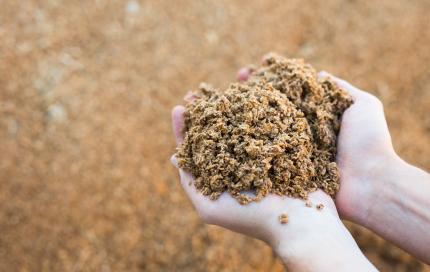Thanks to the European project B-Resilient, Trotec was able to launch the ‘Sweet Corn Cob for Feed’ project, exploring the possibility of using sweetcorn cores in their well-known TrotecMix.
About B-Resilient
B-Resilient is a European innovation project aimed at making SMEs in the food industry more resilient through optimal use of biomass. The project focuses on the optimal use of raw materials through valorization of by-product streams into a variety of bio-based applications. In this project, 1.12 million euros was made available to support European SMEs through project lump sums. These lump sums could be used as travel budgets to participate in the matchmaking event in May 2023 (travel lump sums), to do feasibility studies, validation research and implementation studies etc. (innovation lump sums or business continuity plan lump sums), or to internationalize (internationalization lump sums).
Through the activities organized by B-Resilient, companies get access to a lot of information and inspiration from home and abroad, new contacts can be made and financial support is offered. This in turn can result in taking concrete steps towards the valorization of by-product streams in food companies. This is also the case at NovelYeast.
Trotec and Marrannes join forces
Trotec, founded in Veurne (BE), was a pioneer in the circular economy back in 1986. The company's vision was based on a simple premise: how to help food companies solve their waste and by-products problems. Trotec's philosophy is that by-products are not waste, but a valuable raw material. As a true early innovator, Trotec developed 100% advanced technologies for the safe and efficient handling of by-products. Trotec stands for Total Recycling, Optimisation, Transparency, Ecology and Creativity and has now become the industry leader with a plant in Veurne (BE) and since 2016 also in Albon (FR).
The company transforms vegetable food waste with at least 40% dry matter into high-quality ingredients for animal feed (currently mainly for pigs), preventing food losses and reducing waste.
Two types of food waste are processed:
- Former food waste: Incorrectly formulated doughs and dough residues, misshapen chocolates, rejected products at start-up or batch closure and rejected products due to production line failures,
- Supermarket returns and/or unsellable products: unsold loaves, broken biscuits, incorrectly packaged products...
Wage company Marrannes was established in 2005. The company provides support in the agricultural sector by providing machinery and advice on planting and harvesting. They have advanced machinery for separating and shredding different types of agricultural crops.
Sweet Corn Cob For Feed
Trotec was one of two Flemish SMEs (the other was NovelYeast, read the article here) that received grants in the first round of B-Resilient for their innovation project ‘Sweet Corn Cob For Feed’ (SCC4F). The project had a budget of €54,000.
In the ‘Sweet Corn Cob For Feed’ project, Trotec partnered with Wage Company Marrannes (BE) to handle and process a new product: sweet corn cob. In 2023, sweet corn was processed on a large scale for the first time in West Flanders (by Greenyard). The maize can be used for several applications, but the cob is waste (estimated 180 tonnes of cobs/day) and is mainly used in our region for fermentation and biogas production. This B-Resilient project investigated whether these maize cobs could be introduced into the animal feed chain.

Trotec and Marrannes developed an efficient and safe method for the sustainable processing of the sweetcorn cob and now use it as a circular ingredient for the existing TrotecMix, a premix for the animal feed industry.
The project allowed the partners to investigate the best harvesting methods, ideal storage conditions and storage time, processing steps (cutting, grinding...) and optimal composition of the corn cob in the TrotecMix. In addition to these technical aspects, a business case was also investigated and developed.
Trotec is exploring other possibilities for this new by-product as a circular ingredient, e.g. in animal feed, cattle feed or insect boosters, and is developing new recipes together with knowledge institutions. During the project, an LCA analysis was carried out comparing the use of sweetcorn cob with the use of similar products such as wheat bran. The analysis showed that replacing wheat bran with sweetcorn cob could lead to a CO2 reduction from 0.134 kg CO2eq to 0.107 kg CO2eq. It is still a bit too early for a complete substitution, but gradually more and more sweetcorn cob is being added to the TrotecMix.
Expected benefits
The project resulted in a new method of using sweetcorn cob as a circular ingredient in animal feed, instead of fermenting it into biogas. It was discovered that this new ingredient could be an alternative to wheat bran, reducing the demand for wheat bran for animal feed and helping to address today's market shortages.
The partners, Trotec and Marrannes, will continue to work together on processing sweetcorn cob to use it as an ingredient in TrotecMix. They are also exploring other possible applications for this stream and potential new collaborations.
Finally, the project gave Trotec the opportunity to explore the use of fresh by-product streams (fruits and vegetables) in their business in the future.





